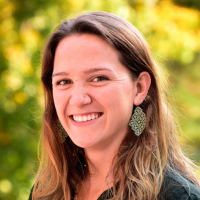Five Gillings student selected to receive 2021 Impact Award, Horizon Award for research benefiting North Carolina
January 15, 2021 [updated April 8, 2021]
Five students from the UNC Gillings School of Global Public Health are among sixteen UNC-Chapel Hill graduate students and recent graduate alumni who have been selected to receive The Graduate School’s 2021 Impact Awards and Horizon Awards.
The longstanding Impact Awards, made possible through the generous support of the Graduate Education Advancement Board, recognize discoveries of direct and present benefit to North Carolina. Horizon Awards, first presented in 2017, recognize research with the potential to make a significant future contribution to the state (and beyond).
Students from 27 different academic programs were nominated this year, said Jennifer Gerz-Escandón, associate dean for interdisciplinary education and fellowship programs within The Graduate School.
“Within this group of nominees,” she added, “reviewers identified a particularly large number whose research is on the cusp of statewide impact. This demonstrates the commitment graduate students and recent graduate alumni have to advancing research that helps the people and communities of our state. More than 300 individuals have received these awards over time, and we are pleased to recognize graduate students and alumni for their important work.”
The awardees from the Gillings School are:
Connor Drake, recent doctoral graduate, health policy and management, Impact Award
Addressing Social Needs in Medical Visits, Improving Health Outcomes and Equity

Dr. Connor Drake
“Successful efforts to reform health care delivery toward better value, prevention and equity require health systems to be more responsive to their patients’ social needs in routine outpatient clinical encounters. These needs include food security, housing stability, employment opportunities, transportation and social support. Current research indicates that these factors drive health outcomes and widen health disparities.
My research is focused on identifying and supporting patients with unmet social needs in diverse primary care settings. This work is relevant to current state policy efforts to improve care across the medical and social care continuum. I partnered with the North Carolina Community Health Center Association, the BlueCross BlueShield of North Carolina Foundation and federally qualified community health centers across North Carolina to offer social needs screening and response as part of a routine medical visit. Specifically, my research sheds light on how predictive analytics can be used with social needs assessment data to identify patients who could benefit the most from having their social needs addressed and the cost of offering social needs screening and response as part of a medical visit.
Through a collaborative discussion, patients who want support with unmet social needs can be referred to financial assistance programs, community-based organizations and social services. I also used qualitative methods to better incorporate patients’ perspectives on how their health care team can partner with them to address both medical and non-medical drivers of health and well-being.
I intend to use these findings to increase implementation of social needs screening protocols and develop tailored interventions that improve health outcomes and equity across North Carolina and beyond.”
Lauren Eaves, doctoral student, environmental sciences and engineering, Impact Award
Documenting Well Water Quality to Evaluate Links to Preterm Births

Lauren Eaves
“In North Carolina, 2.4 million residents use private wells as their drinking water source. Well water quality is not federally regulated, leaving users vulnerable to metal contamination. This is concerning because metal exposure has been associated with preterm birth. In North Carolina, 10.4% of births are preterm, according to National Center for Health Statistics data. The impacts of this are severe — 35% of all newborn deaths are attributed to preterm birth complications — and persist, with children born preterm having a greater risk of later-life adverse health outcomes.
There are, however, few detailed, systematic documentations of well water-based exposure to metals in the state. To address these gaps, my dissertation research, focused within North Carolina, will identify patterns of metals in well water and examine the association between exposure to mixtures of metals and preterm birth incidence.
So far, I have analyzed data from 75,000 individual well water tests conducted throughout all 100 N.C. counties from 2010 to 2019. My study findings indicate that 2.0%, 2.6% and 25.3% of wells were over the N.C. Department of Environmental Quality’s groundwater standard for arsenic, lead and manganese, respectively, and that many metals were significantly correlated, indicating substantial co-exposures.
As my research continues, I will be combining these data with birth certificate records to evaluate the association with preterm birth. Through collaboration with the UNC Superfund Research Program, I am helping to create an interactive online portal so that all North Carolinians can access information regarding their local well water quality.”
Caroline Efird, doctoral student, health behavior, Impact Award
Exploring People’s Stories to Benefit Health, Medical Care

Caroline Efird
“Many of the 3 million North Carolinians who live in rural areas experience unique barriers to accessing sufficient healthcare services. To understand more about perceptions of health, illness and medical care across the state, my colleagues and I at the Southern Oral History Program at the UNC Center for the Study of the American South collected 175 oral history interviews from a diverse array of individuals.
These interviews — part of the Stories to Save Lives: Health, Illness and Medical Care in the South project — help preserve the history of our state and aim to enhance the ways that North Carolinians receive and experience healthcare services. For example, I led a systematic analysis of oral histories that we collected in western North Carolina. The interviewees’ stories illuminated that the closure of a rural hospital’s labor and delivery unit increased local residents’ mistrust of healthcare systems and the existing services at their nearest hospital. As such, the loss of obstetric services could adversely affect health for many members of this rural Appalachian community, beyond the immediate negative implications for local women and infants.
Our dissemination of these (and other) findings from the Stories to Save Lives project supports the work of local healthcare advocates and medical providers who seek to improve healthcare in rural communities where healthcare services are diminishing.”
Elizabeth Kamai, doctoral student, epidemiology, Impact Award
Evaluating Factors at Birth to Predict Children’s Lead Exposure

Elizabeth Kamai
“There is no safe level of exposure to lead. Even low levels of lead exposure are related to cognitive and behavioral problems in children. With lead, prevention is key — once in the body, lead can be stored in bones for decades. Eliminating exposure in children today will improve the health of both those children and their future offspring.
Lead testing in the United States is largely focused on identifying children at risk of high levels of lead exposure; the vast majority of children exposed to lead are not identified using this strategy. In North Carolina, only 50% of children are tested for lead. Moreover, Forsyth County, N.C., is a hotspot for sites of industrial lead production and adult occupational lead exposure, but the impact of environmental lead pollution from these facilities on children’s lead exposure has not been assessed.
My dissertation research links birth certificates, childhood blood lead test results, and publicly available environmental and demographic data to evaluate characteristics that predict both receiving a blood lead screening test and elevated blood lead levels in North Carolina children. I use statistical modeling and inverse probability weighting to estimate how many additional children may have elevated blood lead levels but were never tested. Finally, my research examines how living near industrial facilities in Forsyth County that produce environmental lead impacts children’s lead exposure.
The goal of this research is to inform environmental and public health policies and messaging to improve children’s lead testing and ultimately prevent children’s lead exposure in North Carolina.”
Gretchen Mason, master’s student, public health, Horizon Award
Equipping High School Students to Lead Meaningful Change

Gretchen Mason
“Young Visionaries for Health (YV4H), a research project based in Tarboro, N.C., is led by a group of incredibly driven high school student leaders. YV4H equips the student leaders with research and socio-emotional learning skills to lead meaningful change in their community. My role in this project is as a liaison, or the “glue,” between the research team at UNC, community members and student leaders, as well as holistic wellness coaches on our team. This project is made possible through a partnership with the Community Enrichment Organization, mental health specialists, and a UNC research team from the health policy and management department.
During the first two years, the project focused on how built environments (where individuals eat, play, pray, work and learn) and social environments shape a young person’s ability to be physically active. The first year provided students with mapping, leadership and interviewing skills. In the second year, students received training in research ethics and public speaking skills. During year two, YV4H student leaders recruited more than 40 of their peers at Tarboro High to participate in a study, through a mobile health application, in which they were asked questions about physical activity.
In light of COVID-19, YV4H has shifted its focus inward. This school year’s goal is to equip the student leaders with tools to manage stress and stay mentally well during this time of isolation and remote learning, and beyond. This involves helping students identify individuals in their lives who support their aspirations, as well as bringing in holistic wellness coaches and peer support specialists of color who resonate with the students’ lived experiences. Future implications of this work include the project serving as a model for youth engagement public health programs among rural, minority high school students.”
Contact the UNC Gillings School of Global Public Health communications team at sphcomm@unc.edu.
